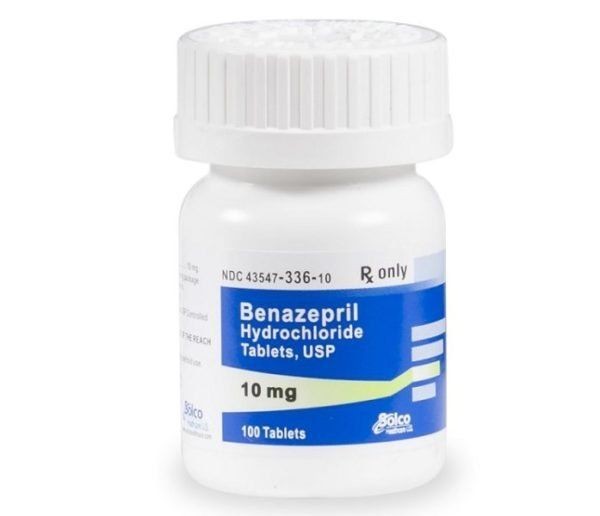
Contents
- 1 Side Effects of Lotensin (benazepril)
- 1.0.1 Important Side Effects of Lotensin (benazepril)
- 1.0.2 Lotensin (benazepril) Side Effects for Healthcare Professionals
- 1.0.3 Drug Interactions with Lotensin (benazepril)
- 1.0.3.1 Diuretics
- 1.0.3.2 Antidiabetics
- 1.0.3.3 Non-Steroidal Anti-Inflammatory Agents Including Selective Cyclooxygenase-2 Inhibitors (COX-2 Inhibitors)
- 1.0.3.4 Dual Blockade Of The Renin-Angiotensin System (RAS)
- 1.0.3.5 Mammalian Target Of Rapamycin (MTOR) Inhibitors
- 1.0.3.6 Lithium
- 1.0.3.7 Neprilysin Inhibitor
- 1.0.3.8 Gold
- 1.0.4 Summary
Side Effects of Lotensin (benazepril)
Lotensin relaxes blood vessels to improve blood flow. It is also used to treat heart failure and protect the kidneys from diabetes-related harm.
Common side effects:
- dizziness
- lightheadedness
- drowsiness
- headache during medication adjustment
- dry cough
Serious side effects include:
- fainting
- high potassium blood level symptoms (muscle weakness, slow/irregular heartbeat)
- infection symptoms (fever, chills, persistent sore throat)
- change in urine amount
- serious liver problems (yellowing eyes/skin, dark urine, severe stomach/abdominal pain, persistent nausea/vomiting)
- severe allergic reaction (rash, itching/swelling, severe dizziness, trouble breathing)
Lotensin can interact with aliskiren, lithium, and drugs that increase potassium levels in the blood (angiotensin receptor blockers/ARBs, and birth control pills with drospirenone).
Cough-and-cold products, diet aids, and nonsteroidal anti-inflammatory drugs (NSAIDs) can raise blood pressure or worsen heart failure when taken with Lotensin.
Lotensin is not recommended during pregnancy and nursing. Consult your doctor for more details.
Important Side Effects of Lotensin (benazepril)
Benazepril is generally well tolerated with mild and transient side effects such as:
- Abdominal pain
- Constipation
- Diarrhea
- Dizziness
- Fatigue
- Headache
- Loss of taste
- Loss of appetite
- Nausea and vomiting
- Easy bruising or bleeding
- Chest pain
- Chills
- Difficulty breathing
- Numbness or tingling in the hands or feet
- Rash
- Impotence
- Sore or swollen throat
Benazepril use can cause a dry, persistent cough that resolves after discontinuing the medication. Rare side effects include liver dysfunction, yellowing skin (jaundice), swelling of facial tissues, low white blood cell counts, and increased infection risk.
Lotensin (benazepril) Side Effects for Healthcare Professionals
Adverse reactions seen in clinical trials may not directly reflect real-world rates. Lotensin’s safety has been evaluated in over 6000 hypertension patients, with reported adverse events at a similar rate to placebo patients.
Common reasons for discontinuation:
- Headache
- Cough
More frequent adverse reactions with Lotensin include:
- Headache
- Dizziness
- Somnolence
- Postural dizziness
Less common side effects include:
Dermatologic: Stevens-Johnson syndrome, pemphigus, hypersensitivity reactions (dermatitis, pruritus, rash), photosensitivity, flushing.
Gastrointestinal: Nausea, pancreatitis, constipation, gastritis, vomiting, melena.
Hematologic: Thrombocytopenia, hemolytic anemia.
Neurologic/Psychiatric: Anxiety, decreased libido, hypertonia, insomnia, nervousness, paresthesia.
Laboratory Abnormalities
Elevations in uric acid, blood glucose, bilirubin, liver enzymes, hyponatremia, electrocardiographic changes, eosinophilia, and proteinuria have been reported.
Drug Interactions with Lotensin (benazepril)
Diuretics
Hypotension
Patients on diuretics may experience excessive blood pressure reduction with Lotensin. Minimize hypotension risk by discontinuing or decreasing diuretic dose before starting Lotensin.
Hyperkalemia
Potassium-sparing diuretics can increase hyperkalemia risk. Monitor serum potassium frequently if concurrent use is necessary. Lotensin reduces potassium loss caused by thiazide-type diuretics.
Antidiabetics
Combining Lotensin with antidiabetic medicines may raise hypoglycemia risk.
Non-Steroidal Anti-Inflammatory Agents Including Selective Cyclooxygenase-2 Inhibitors (COX-2 Inhibitors)
Coadministration of NSAIDs, especially in elderly, volume-depleted, or compromised renal function patients, with ACE inhibitors like benazepril, may worsen renal function, including acute renal failure. Monitor renal function periodically. NSAIDs can reduce the antihypertensive effect of ACE inhibitors.
Dual Blockade Of The Renin-Angiotensin System (RAS)
Dual blockade of RAS with angiotensin receptor blockers, ACE inhibitors, or aliskiren increases hypotension, hyperkalemia, and renal function changes risk compared to monotherapy. Most patients do not benefit from combined RAS inhibitors. Monitor blood pressure, renal function, and electrolytes closely. Do not coadminister aliskiren with Lotensin in patients with diabetes or renal impairment.
Mammalian Target Of Rapamycin (MTOR) Inhibitors
Combining ACE inhibitors with mTOR inhibitors can increase angioedema risk. Monitor for signs of angioedema.
Lithium
Concomitant use of lithium and Lotensin can cause lithium toxicity. Monitor serum lithium levels during concurrent use.
Neprilysin Inhibitor
Concurrent use of neprilysin inhibitors increases angioedema risk.
Gold
Injectable gold therapy with concomitant ACE inhibitor use can cause nitritoid reactions (facial flushing, nausea, vomiting, hypotension).
Summary
Lotensin (benazepril) is an ACE inhibitor used for hypertension. Common side effects include dizziness, lightheadedness, drowsiness, headache during medication adjustment, and dry cough. Do not use Lotensin during pregnancy and breastfeeding. Consult your doctor for more details.


